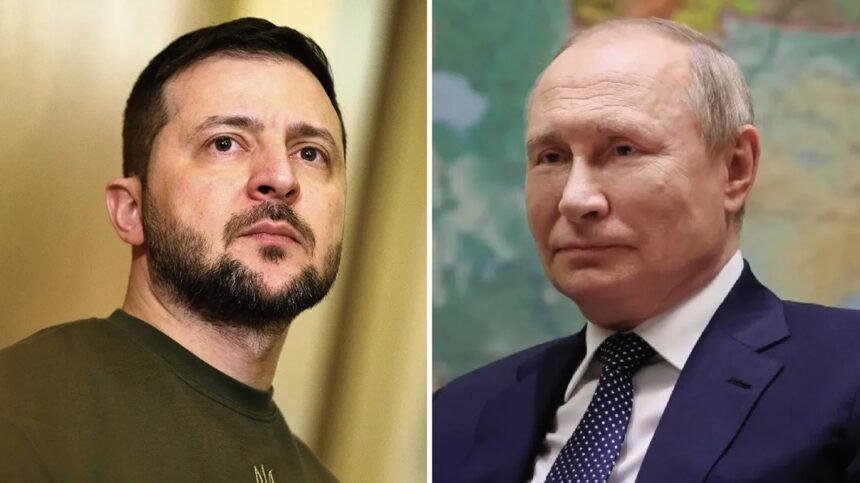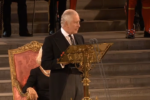The agreement reached Monday at the White House on the next step — a bilateral meeting between Russian President Vladimir Putin and Ukrainian President Volodymyr Zelensky — appeared widely unanimous. Then came Moscow’s response.
“The idea was discussed that it would be appropriate to explore the possibility of raising the level of representatives of the Russian and Ukrainian sides,” Kremlin aide Yury Ushakov told reporters about U.S. President Donald Trump’s call with Putin. Neither leader was mentioned by name, nor was there any indication that “representatives” would be elevated to that level.
Russian Foreign Minister Sergei Lavrov struck a more conciliatory tone later Tuesday in an interview with state television. “We do not reject any form of work — bilateral or trilateral,” he insisted. But he added: “Any contact involving top officials must be prepared with the utmost care.”
In Kremlin terms, that means they are nowhere near ready to agree, CNN reported.
And this should come as no surprise.
This is a war Putin began by unilaterally recognizing parts of Ukrainian territory (the self-proclaimed Donetsk and Luhansk People’s Republics) as independent. He has argued that Ukraine is “an inseparable part of the history, culture, and spiritual space of Russia” and that its separation from Moscow was a historical mistake.
So, if such a meeting were to happen, as Orysia Lutsevich, director of the Russia and Eurasia program at Chatham House, put it, Putin “would have to admit the failure of sitting at the table with a president he considers a joke from a country he claims doesn’t exist.”
It would also be a major shift in tone, difficult to explain to the Russian public. “(Putin) has brainwashed so many Russians through state television into believing Zelensky is a Nazi, that Ukraine is a Western puppet state … that Zelensky is illegitimate. Why suddenly talk to him?” she argued.
The Kremlin regularly questions the Ukrainian leader’s legitimacy, pointing to the postponement of elections in Ukraine under martial law. In its latest so-called “peace” memorandum, Russia even demands Ukraine hold elections before any final peace treaty is signed. Putin and other Russian officials rarely refer to Zelensky by name, preferring instead the harsh label “Kyiv regime.” And recall that it was Zelensky who traveled to Turkey for the first face-to-face talks in mid-May, while Putin sent a delegation led by a history textbook author.
Tatiana Stanovaya, senior fellow at the Carnegie Russia-Eurasia Center and founder of R.Politik, which provides news and analysis on Russia, argues that while Putin doesn’t see a meeting with Zelensky as critical — since, for Moscow, the war is more about confronting the West than Ukraine — he could accept such a meeting if he believed it would succeed.
“The main demands must be on the table, and Zelensky must agree to discuss them,” she told CNN. So far, Zelensky has ruled out those core demands, which include ceding territory still under Ukrainian control. But Putin, she argued, views Trump as the key to shifting that stance.
“Trump is seen as an enabler of the Russian vision for a settlement, and therefore the U.S. must work with Kyiv to push it to be more flexible, more open to Russian demands,” Stanovaya said.
She suggested Moscow might try to keep the U.S. engaged by doing what Ushakov hinted — proposing another round of talks in Istanbul with a higher-level delegation, possibly including Ushakov himself and Foreign Minister Lavrov. But Putin would not risk a “trap” by sitting down with Zelensky only to see all of Russia’s demands rejected.
Trump closed out Monday by posting on Truth Social that he had “begun preparations for a meeting … between President Putin and President Zelensky.” By Tuesday morning, during a Fox News interview, he seemed to realize it was far from a done deal: “I sort of set it up with Putin and Zelensky, and, you know, they’re the ones who have to decide. We’re 7,000 miles away,” he said.
For now, Putin has no incentive to agree. Without making concessions, he has already been rewarded with a major summit in Alaska, avoided Trump’s request for a pre-talks ceasefire, and sidestepped all sanction ultimatums to date. While Russia temporarily reduced overnight drone strikes on Ukrainian cities in early August, it escalated again Monday night, launching 270 drones and 10 missiles. If Trump’s pressure on Zelensky hasn’t yet delivered Moscow the results it wants, Russia can always fall back on military force.
The only unpredictable factor for Moscow at this point is whom Trump will blame when this latest peace push fails. /CNN







